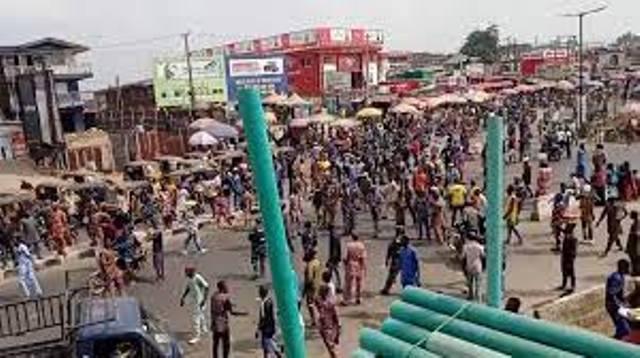Protesters, in their thousands, on Wednesday, blocked major roads within Ibadan metropolis over the scarcity of fuel, new naira notes and the rejection of the old notes by commercial banks and commercial outlets.
The News Agency of Nigeria (NAN) reports that the protests, which were still spreading, affected some areas like Iwo Road, Bodija, Mokola, Eleyele/Eruwa Road, Gbopa, Ologuneru, Apete, Challenge and Orita roads.
NAN reports that the protests resulted in traffic gridlocks in the affected areas, forcing commuters to take to their legs and drivers seeking alternative roads to their destinations.
The protesters, who were mostly youths, were seen burning tyres on the roads, while motorists were hurriedly making u-turns to avoid being caught up in the protest.
Most of the motorists plying the roads in the affected areas were seen displaying leaves conspicuously in front of their vehicles as a show of solidarity with the protesters.
At Iwo road, some suspected hoodlums were seen harassing motorists, tricycle and motorcycle riders as well as passers-by, while traders hurriedly closed their shops to prevent looting.
Sources said that the protests around Eleyele/Ologuneru axis of the capital city were led by transporters.
Witnesses at the scenes said that the transporters were obstructing free flow of vehicular and pedestrian movements around the axis.
Some of the transporters said that they were out to protest the non-availability of cash as well as the rejection of the old N200, N500 and N1,000 notes by passengers and filling stations.
The protesters called on the Federal Government and the Central Bank of Nigeria (CBN) to urgently address the situation, as they could no longer stand watching their livelihood being threatened.
However, men of the Nigeria Police Force, Amotekun and other security agencies were seen stationed at different strategic locations of the metropolis to prevent breakdown of law and order.
COMMUTERS STRANDED
Commuters in Ibadan were, on Wednesday, stranded, as commercial drivers, motorcyclists and tricyclists refused to accept old naira notes.
The News Agency of Nigeria (NAN) reports the situation forced some commuters to resort to trekking long distances to their respective destinations, while those who could not trek simply returned home.
NAN observed that the roads in some areas within the metropolis like Omi-Adio, Apata, Challenge and Mokola roundabout were deserted, as only few commercial drivers collected the old naira notes.
NAN also reports that the situation was further compounded by the protests that rocked some parts of the state capital over scarcity of fuel and new naira notes.
A commercial bus driver, Mr Mukaila Akanbi, said that he refused to collect old naira notes because filling stations were rejecting old notes from him.
“If I collect old naira notes, how do I spend it? Unfortunately, most banks are not opening for business,” he said.
A trader, Mrs Alice Adebola who boarded a bus and paid with old naira note, said that the money was rejected by the driver.
She appealed to government to provide enough new naira notes before the situation got out of control.
“Honestly, I don’t know what to do now. I took my wares to the market but old notes were being given to me. If I reject it, I will not sell and be able to feed my family; if I accept it, nobody will collect it from me.
A bean seller, Mallam Kabir Mohammed, who had many people milling around him for accepting old naira notes, however, said he decided to do so as a strategy to sell his wares.
“I decided to collect old naira notes with the hope of selling my wares, restock and resell again,” he said. Mohammed urged the government to save the situation by making new naira notes available or, in the alternative, allowing old notes to be accepted as legal tender to bridge the supply gap.













